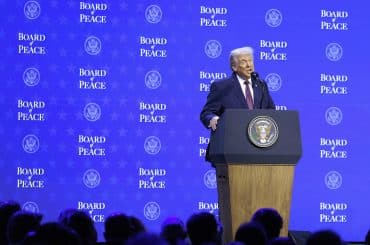If covering oft-ignored salient points counts as a home run, human rights activist Moe Diab knocked one out of the ballpark in his interview with host Jaisal Noor on today’s episode of the RealNews.
From Matt Lee’s grilling of State Dept spokesperson Jen Psaki on Martin Indyk’s history of failure to the new adjustment to the original 2002 Arab Peace Initiative as well as Noura Erakat’s suggestion of internationalizing the process to everything in between, Diab doesn’t let up.
NOOR: So, Moe, we want to get your response to this latest news of Israel approving 1,200 new settlement units. And they’re particularly sensitive, because most of the units are located in isolated settlements that Israel is unlikely to retain if and when a Palestinian state is created. Can you talk about the impact this new announcement by Israel will have on these latest round of talks that Secretary Kerry is so optimistic about?
DIAB: Well, I think it comes as no surprise. They don’t comply with international law. The goals of this peace process don’t include ending the problems that are causing the conflict, just ending the claims and ending the conflict. So the fact that this was announced is really no surprise. They continued the building of the settlements in the last peace process. And at this point, they even openly announced that they are going to be building settlements in the proposed Palestinian state for this peace process, which is based on the 2002 Arab Peace Initiative. So it comes as no surprise. And this process is bound to fail for that reason. So I don’t think anybody at all is surprised for this.
NOOR: And I think the Western media, the mainstream media often, you know, misses that key fact that it’s actually been during the years of the so-called peace process that Israel has had some of the largest settlement expansions in Palestinian territory.
DIAB: Yes, absolutely. I mean, the facts on the ground are largely ignored and they’re distorted and they’re presented in Western media to portray the situation as a complete opposite of what it is. It’s not portrayed as an occupation of Palestinian territory. It’s not portrayed as a military against an occupied people. It’s really portrayed as two sovereign nations involved in a conflict.
NOOR: Yet Secretary John Kerry insists that this round of peace talks will be different. Can you talk about his goals and what the actual outline of what’s being proposed looks like?
DIAB: Well, I think that’s a really good question a lot of people have been asking. And I think the best way to answer this for everyone is to look at the actual main source for this. About two weeks ago, on July 29, at the State Department’s official press briefing, spokesperson Jen Psaki was unable to answer Associated Press journalist Matt Lee’s simple and fundamental question asking what’s different this time, what’s changed. Considering Martin Indyk’s long record of failure–and the whole team’s record of failure, for that matter–and if the official spokesperson is unable to answer the most fundamental question, it’s clear that no changes have been made to increase the chances of reaching a sustainable resolution for the Israeli-Palestinian conflict.
The appointment of Martin Indyk, who is the former ambassador to Israel, as the U.S. envoy for these talks is another clear indication that no changes in the framework have been made from the last 22 years of failed U.S. diplomacy. And now we’re trying the same thing again and again for 22 years, and we’re not seeing a different result. That’s either insanity or it’s intentional failure.
In this case, as we have seen in the past whenever these peace talks resurface, the timing of the process is usually followed by an eruption of crises in the Middle East. And in this case, the inability of the U.S. to respond strategically to these challenges is enough motive to use the peace talks as a way to distract from the the U.S. failures in the Middle East and as a way to reassure Israel’s backers and as reassertion of the U.S. as an existing power.
And if you want to mention the goals of this process, now, the goals were simply stated as ending the conflict, ending the claims. But it was also said that it was based on the 2002 Arab Peace Initiative, and everybody thinks that this is going to be a great start. And theoretically it would be a great start. However, what Kerry failed to mention was the slight U.S. and Israeli adjustment to the original 2002 Arab Peace Initiative, which has deprived it of any potential it may have had. Originally in the plan, the Arab states were offered normalization with Israel only after full withdrawal from the 1967 territories and after recognizing the Palestinian right of return based on UN Resolution 194. So what we’re seeing is his goals are ignoring the facts on the ground and don’t address the problems which are causing the conflict. How can you simply end the conflict without changing anything?
NOOR: So, Moe, what are the facts on the ground in occupied Palestine right now?
DIAB: I think the facts on the ground are plain to see. Israel continues to annex Palestinian territory. Israel persists in demolishing Palestinian homes and populating Palestine with Israeli civilians. They routinely detain Palestinians without charges under the policy of administrative detention, and they maintain the policy of collectively punishing 1.57 million Palestinians through its imposition of the blockade on the Gaza Strip. And Israel prosecutes its occupation with impunity, refusing to accept the world’s calls to respect international law. Neither Israel nor its proxies can justify the facts on the ground in occupied Palestine, so they distract, distort, and defame to allow the violations to go on.
NOOR: And can you talk a little bit more about Martin Indyk? You know, he is appointed as the U.S. envoy to these talks, yet it would be hard to call him an impartial figure. You know, he was the deputy–he was the former deputy research director of AIPAC, the pro-Israel lobby in Washington.
DIAB: Absolutely. And he was also the former ambassador to Israel. So choosing him to be the U.S. envoy for these peace talks for obvious reasons leads to the assumption that there is no good-faith intention in this peace talk. The mediator should coordinate with both sides a balanced and unbiased perspective. And what we’re seeing and what we have seen in the past is the simple U.S. siding with Israeli power and the deprivation of Palestinian representation and rights.
So if–something that also is very important is to recognize the fact that Israel, who is supported by the United States, has one of the most stable economies in the world, the fourth most powerful military in the world, and the U.S. is trying to mediate talks with the Palestinians, who are stateless and disempowered, who are living under constant occupation, who are living in apartheid conditions, who don’t have a military and don’t even have control of their own airspace. So for these reasons, until the negotiations are not based on support for Israeli power but based on international law, human rights, and equality for all, the peace process will unquestionably continue to fail.
NOOR: And so we spent the first seven minutes attacking these talks essentially, or at least to drawing out the criticisms of them. Do you have a proposal that you think would be a just solution to this, the Palestinian-Israel conflict?
DIAB: I think a good point to reference this would be from last March on MSNBC’s news program Up with Chris Hayes. He had guest speaker Rashid Khalidi on the show, and he made the really clear point that negotiations were designed to prevent Palestinian statehood and sovereignty. And the U.S. is–like I mentioned before, the U.S. is not playing the necessary balanced role as the mediator, and with heavily biased and corrupt mediators the logical thing to do, the first step thing to do would be to remove the obstacles, in this case the U.S. being the mediator and arbitrator for these talks, ’cause they are preventing a good-faith peace process. And to involve new players is obviously very crucial in order to see an actual change in this process.
Also, human rights lawyer and Georgetown University associate adjunct professor Noura Erakat has suggested internationalization of the issue several times as a place to start. And she uses this term to reference letting go of America’s role as the arbitrator and aid donor and employing the United Nations General Assembly in the process. So while Israel and its proxies may wish to ignore the world’s efforts to induce compliance with international law, it’s contrary to the aims and purposes of the United Nations to distract attention or to distort the facts on the ground. So internationalization also refers to utilizing the resources that are made available by the United Nations, such as utilizing the International Criminal Court and International Court of Justice. Obviously, this alone is not going to completely solve the peace process and the conflict, but it definitely is more promising than following the last 22 years of failed U.S.-brokered attempts to resolve this issue.
NOOR: Moe Diab, thank you so much for joining us. Moe is a Palestinian-American human rights activist, blogs at MoeDiab.com.
DIAB: Thank you for having me.
NOOR: And thank you for joining us on The Real News Network.
Great job Moe.


Moe Diab is spot on with the entire situation!
Goodness gracious, if only one of our elected leaders could tell the truth, for once. Anytime now would be much appreciated…
Thanks for this, Annie.
The Peace Process:
http://www.youtube.com/watch?v=PtGmkgVOcTQ&feature=endscreen&NR=1
Says it all, really.
“Originally in the plan, the Arab states were offered normalization with Israel only after full withdrawal from the 1967 territories and after recognizing the Palestinian right of return based on UN Resolution 194. ” (Moe Diab)
First, it was not the Arab states that were offered normalization; the offer was made TO Israel in 2002 and 2007 and Israel twice rejected the offer based on a pretext t0 stall and permit the continued expansion of the settlements.
Second, In spite of Israel’s rejection of the Initiave in 2002 and 2007, this did not prevent the start of partial normalization by Arab states since many of them already have ongoing business and military dealings with the rogue state and some have even allowed Israel to have commercial offices established in them. This is evidently taking away any incentive to have Israel seriously reconsider the Initiative. If Arab states are not taking this matter seriously, why should the US?
Moe Diab makes a reference to Up with Chris (Hayes) that ran on MSNBC last March. Rashid Khalidi was a guest. The transcript can be found here.
You have to scroll down a LONG LONG way to reach the part of the transcript that features Rashid Khalidi.
Meanwhile Israel is fretting about the Sinai all over al jazeera, with AJ , after a new Qatari government, is echoing their claims of sinai militant ties to the MB.
http://blogs.aljazeera.com/topic/egypt/video-morsi-supporters-and-opponents-clash-cairo
And the Liberal secularists are finally awake to the realization of Martial Law , Military rule in preparation for a civil war against the terrorists:
http://www.nytimes.com/2013/08/14/world/middleeast/egypt.html?_r=0